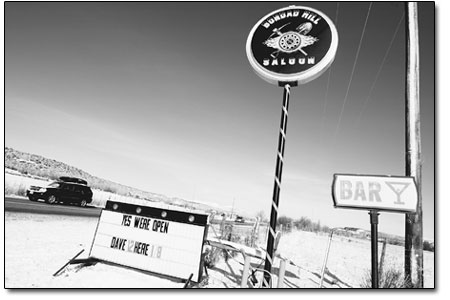| ||
A divided highway
by Michelle Duregger Business and transportation are at odds south of Durango. Plans to widen U.S. Hwy. 550 near Bondad are stirring strong emotions from roadside businesses and residents. Traffic has grown steadily along the highway linking Durango and Aztec in recent years, and that growth has raised safety concerns. As a result, the Colorado Department of Transportation has planned a project this summer to widen the highway to four lanes from Bondad, south 3 miles to the stateline. However, the widening of the road will also pave sections of two business and residential properties, much to the chagrin of area land and business owners. One affected business, Bondad Hill Saloon, is not going down without a fight. Owner Guy Kemp is lobbying for state funding to have his business moved back from the road and to build a new bar and grill. Farther south, Y-Knot Stop is in a more complicated predicament. As a lessee, owner Bill Pebbles faces relocation from the “last stop before you hit New Mexico.” In his 60s, Pebbles is not enthusiastic about the prospect of starting his business over again, particularly since he is midway through improvements at the current location. The road widening will take asphalt right up to his front door, wiping out truck parking as well as handicapped parking and effectively putting an end to his business at its current location, he said. “Ranchers are a little irritated, but they are only losing a little pasture land, I’m losing my livelihood,” Pebbles said. Pebbles’ conundrum is the result of miscommunication between himself and his leasing company, which the Colorado Department of Transportation says it is trying to ameliorate. In 1998, easements were purchased by CDOT on the edge of Pebbles’ leased property. The details of the purchase went by the wayside through faulty communication between Pebbles and “Dick and Jane’s,” his leasing company. “I checked the county paperwork when I leased and didn’t see anything about a road being expanded,” he said. The challenges and headaches run on both sides, CDOT must lay down safe roads while wisely spending funds to relocate and assist those affected by the project. Costs covered range from mortgage assistance and moving costs to lease differences. However, this must all be done within a budget. “It’s not an open checkbook,” said Shane Harris, CDOT’s right of way manager. Harris admits that the system is not perfect, but it is the best plan thus far, accommodating growth while providing a safe transportation corridor. Business owners are not the only ones feeling the sting of the project. Several residents along the project footprint are up in arms, though they declined to go on record. Their concerns range from uncertainty about the suitability of relocation to surprisingly low property appraisal values. In addition, changes in the road plan since the environmental assessment meetings in 2005 have caused frustration. CDOT counters that the project has not been kept a secret from the community and that public meetings were held in conjunction with an environmental study on the project. “This shows the importance of communication,” said Nancy Shanks, CDOT public relations manager. Though jolting to those affected and a surprise to those who were the left in the dark by landlords and leasing companies, the state agency has made extensive efforts to inform the public. Nonetheless, the agency is sympathetic. “A study is one thing,” Harris said. “People start to get excited when they are impacted.” Pebbles agrees, noting that his current predicament came as a complete surprise. Meanwhile, U.S. Highway 550 near Bondad continues to be frozen with unknowns. “We hope to find out what will happen in December or January … Merry Christmas,” said one upset property owner last month. In spite of the raised hackles, CDOT says it is simply trying to get the job done, not ruin lives. In this spirit, officials say efforts are under way to mend the communication gaps and strike favorable agreements with the property owners prior to the onset of the summer construction season. “When you are facing acquisition, it can be difficult,” said Harris. “Property owners that keep an open mind do a lot better.” •
|
In this week's issue...
- December 18, 2025
- Let it snow
Although ski areas across the West have taken a hit, there’s still hope
- December 18, 2025
- Look, but don't take
Lessons in pottery theft – and remorse – from SW Colorado
- December 11, 2025
- Big plans
Whole Foods, 270 apartments could be coming to Durango Mall parcel


